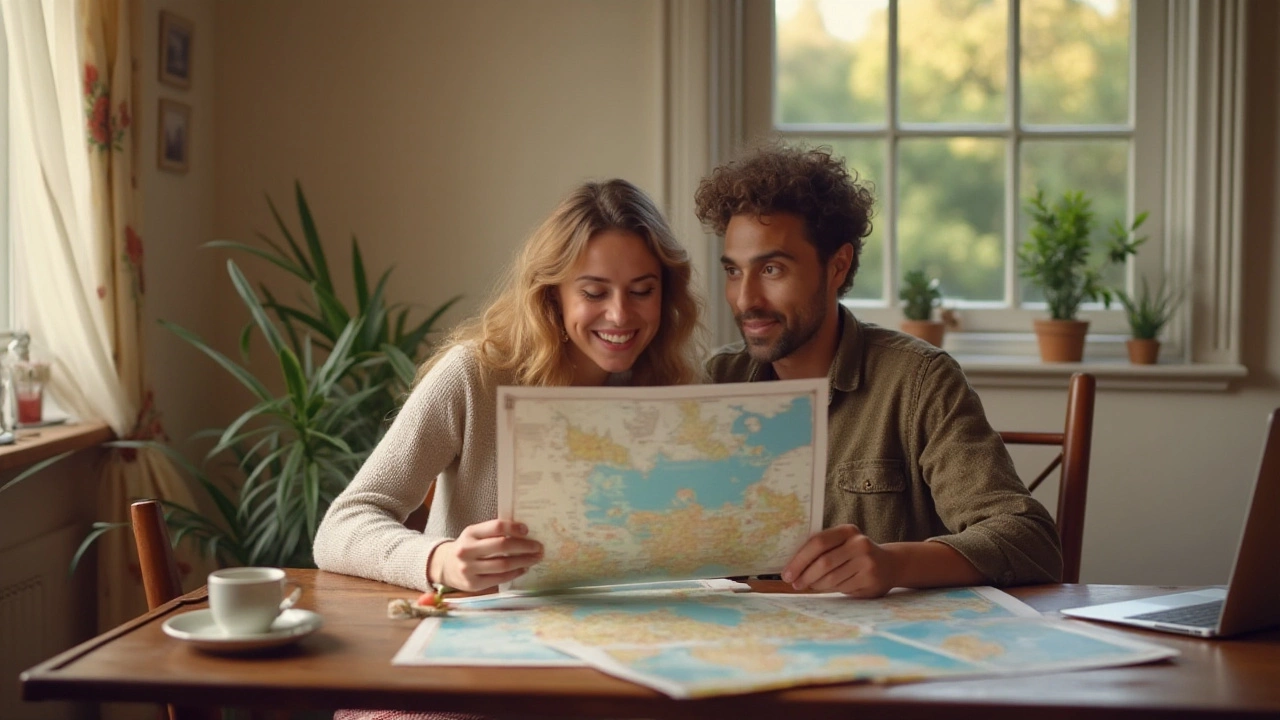Affordable Vacation Ideas: How to Travel on a Budget
 Oct, 26 2024
Oct, 26 2024
Traveling can be one of life's greatest joys, offering new experiences and perspectives. But what if you want to see the world without emptying your wallet? In today's world, where travel can quickly become expensive, planning a budget-friendly vacation is more possible than ever.
This guide will navigate you through smart strategies to explore without overspending. From researching discounts and deals to finding accommodations that fit your budget, and discovering activities that don't cost a dime, a memorable vacation is within reach. Whether you're a seasoned traveler or a dreamer planning your first trip, these tips are designed to help you embark on your journey without the financial stress.
Research and Planning
The first step to any successful budget-friendly vacation is thorough research and planning. It sets the foundation for everything else and can mean the difference between a costly trip and a cost-effective adventure. A great starting point is to utilize the vast resources available online, such as travel blogs, forums, and official travel sites. These platforms provide valuable insights into destinations, climate, peak seasons, and local tips that can help you avoid tourist traps and embrace authentic experiences. Knowing a destination’s peak times can help you plan your budget vacation during off-peak periods, when prices are typically lower and attractions less crowded, making your travel experience both affordable and enjoyable.
Beyond online resources, consider leveraging the power of social media. Follow travel influencers and join travel groups where seasoned travelers share their tips and recent experiences. This can give you real-time updates on deals and must-see spots that might not yet be noted in guidebooks. Engaging with these communities can also provide you with unique perspectives that are invaluable in plotting your journey efficiently. Sometimes, it's the hidden gems that turn a trip from ordinary to extraordinary, and finding these often requires a bit of digging and patience.
A crucial tool in the planning phase is creating a detailed itinerary. While spontaneity is exciting, having a rough plan can help you avoid overspending. Identify key attractions and activities you wish to indulge in and align them with suggested free or low-cost alternatives. Online platforms often host comprehensive travel itineraries suited for cheap travel. These often include not only places to visit but also advice on when to avail discounted entrance fees or happy hours for budget bites.
Setting a Realistic Budget
Setting a realistic budget is another pivotal part of your planning process. Determine what you can afford and allocate portions of your budget to essentials like accommodation, food, transport, and souvenirs. Use budget calculators available on travel websites to map out potential expenses per day. Keeping track of your spending is also essential. Many travelers recommend apps that track expenses daily, helping you stay within your limits while still having the freedom to enjoy unexpected opportunities that might arise spontaneously during your trip.
"Traveling does not have to be expensive; it just requires more thoughtful planning and decision-making," advises Pauline Frommer, a respected travel expert known for her cost-saving tips. Her words echo the sentiment that planning is the real secret behind affordable travel.
Consider using a combination of methods to track prices on flights and accommodations. Subscription alerts can notify you about price drops on destinations you’re interested in. These tools allow you to book when prices are most favorable, an essential aspect of affordable travel. As you're planning, remain flexible with your dates; sometimes shifting your travel period by a day or two can save you significantly on airfare.
Finally, weigh the pros and cons of travel insurance. While it's an additional cost, it can save you from unforeseen expenses, providing peace of mind. When you plan every dollar in advance, your trip becomes less about worrying over money and more about the present adventure looming ahead. This careful approach to research and planning lays the groundwork for an affordable, enjoyable journey where you get the best of experiences without the hefty cost.

Budget-Friendly Accommodations
Finding a place to stay while traveling doesn't have to punch a hole in your wallet. The world is filled with alternatives to expensive hotels that offer both comfort and character. One of the most rewarding aspects of looking beyond traditional accommodations is the unique experiences you can discover. For example, opting for cheap travel options like hostels can lead you to meet fellow adventurers from every corner of the globe, providing both a place to rest and a social space to share travel stories and tips.
Hostels are no longer just about dorm rooms; many offer private rooms and a boutique hotel atmosphere at a fraction of the cost. Websites like Hostelworld make it easy to find top-rated options that fit your needs, whether it's a vibrant city scene or a tranquil countryside retreat. Another great option is vacation rentals through platforms such as Airbnb and Vrbo. These allow you to book entire homes or apartments, which can be particularly economical if you're traveling with a group or family. They often come equipped with kitchens, which can further help in cutting costs by allowing you to prepare your meals.
For those open to something a bit different, consider house sitting. Websites like TrustedHousesitters connect travelers with homeowners looking for someone to care for their homes and pets while they're away. This setup can provide free accommodation in exchange for some basic responsibilities. It’s a wonderful way to feel at home in a foreign place while keeping your budget intact.
“Travel is the only thing you buy that makes you richer.” This quote, often attributed to an unknown author, holds especially true when you discover Couchsurfing. This community of travelers offers free places to stay. More than saving money, it connects you with locals who can provide insider tips about the best places to visit and eat. It’s a chance to dive deep into the culture and way of life of the place you're visiting.
In recent years, glamping has also gained popularity, offering a glamorous twist on traditional camping. It combines the best of being close to nature with some of the comforts you might miss when camping. Many sites come with fully furnished tents or tiny cabins. With locations ranging from beaches to mountains, glamping can be a delightful alternative that mixes adventure with relaxation.
For travelers who crave community and connection, WWOOFing (World Wide Opportunities on Organic Farms) offers an affordable and engaging way to travel. In exchange for a few hours of work each day, participants receive accommodation, meals, and the opportunity to learn about sustainable farming practices directly from those who live them. This experience can be both enriching and enlightening, as well as a fantastic method of stretching your travel funds.
If you're aiming for a budget trip, leveraging these budget vacation options can significantly cut costs while enriching your experience. Booking in advance and using tools like Price Alerts for accommodations can help you pounce on deals. Review sites like TripAdvisor can be invaluable for getting insights into what to expect for your stay, ensuring that even if you're paying less, you're still getting quality and comfort.

Low-Cost Activities
Traveling doesn't have to mean blowing your budget on expensive attractions. There's a world of low-cost activities that can enhance your journey without costing a fortune. In many cities, you’ll find a treasure trove of experiences that are either free or come at a minimal cost. From wandering through bustling markets to enjoying nature’s splendor, there are countless ways to immerse yourself in new surroundings. For those who relish exploring vibrant cultures, consider taking a self-guided walking tour. Often, these tours are available as downloadable maps or apps that highlight points of historical and cultural importance. Not only do they provide a rich narrative of the area, but they also allow you to explore at your own pace and discover hidden gems that might be overlooked in a traditional tour.
Connecting with locals can also enhance your travel experience in unexpected ways. Community events, like local fairs or farmers' markets, offer a unique glimpse into the daily life of an area. Engaging with locals can lead to delightful conversations and stories that you won’t find in any travel guide. Such gatherings can also be opportunities to sample local delicacies that might be pricey in restaurants but delightfully affordable at a market stall. Furthermore, many cities host free museum days or cultural festivals that showcase the area's heritage. Research the timing of your visit to align with such events for a more enriching experience.
"Travel is the only thing you buy that makes you richer," said an unknown author, yet the sentiment resonates deeply when exploring low-cost travel opportunities.Nature offers a wealth of free activities, from serene parks perfect for a sunny day picnic to mountain trails for the adventurous soul. Many national parks worldwide offer free entry days or discounted access during off-peak seasons. Hiking, birdwatching, and simply spending a few hours amidst nature are fulfilling ways to connect with the land around you. It’s these experiences that often provide a profound sense of satisfaction and personal growth that money simply can't buy.
If you’re traveling to a coastal area, spending a day at the beach can be both budget-friendly and rejuvenating. Depending on the location, you might come across free beach concerts, yoga sessions, or even classes in surfing or snorkeling for a small fee. Always keep an eye out for such opportunities by visiting local tourist information centers or checking community bulletin boards. The ocean itself offers endless entertainment through swimming, building sandcastles, or simply watching the sun set on the horizon.

Saving on Transportation
Transportation costs can often be the most daunting part of planning a budget vacation. However, with some strategic thinking and advance planning, you can cut down these expenses significantly. One of the most effective methods is to take advantage of off-peak travel times. Booking flights, trains, or buses during the middle of the week or during non-peak hours can lead to considerable savings. Airlines and other travel providers often hike prices during weekends and holidays when demand is highest. By being flexible with your schedule, you can enjoy the same destinations at a fraction of the cost.
Another valuable tip is to subscribe to alerts from travel deal websites and apps. These platforms offer last-minute deals, mistake fares, or discounts on flights and even car rentals. Many travelers have snagged incredible deals, such as flights to Europe for less than a hundred dollars, just by staying informed about these opportunities. Keeping your search and browsing history clear can also prevent price hikes due to the digital cookies that follow your searches online.
Public transportation is another brilliant way to keep your travel costs down, particularly in cities known for their efficient networks. Cities like Tokyo or Berlin have user-friendly, extensive systems that make it easy to navigate without renting a car. Not only does this save money, but it also allows you to mingle with locals and get a taste of daily life. In many destinations, purchasing a tourist pass can be economical, offering unlimited travel within a set period. "Public transit is often the heartbeat of a city," says travel expert Sarah Johnson.
I always recommend it to budget travelers as a way to enrich their journey while saving money. It’s travel with a local lens.
For long-distance travel, consider booking trains or buses in lieu of pricier airlines. Overnight sleeper trains are a classic example of this strategy. It eliminates the need for a night's accommodation while you travel to your next destination. In many parts of the world, buses can be an incredibly cost-effective option. Many bus companies offer services akin to flights with reclining seats, Wi-Fi, and even snacks onboard, at a fraction of the airline costs. It’s also noteworthy that regional rail passes can provide unlimited travel in certain areas, unlocking significant savings if you plan to move around a bit.
Those visiting multiple cities or regions might also find car-sharing services or ride-sharing apps a boon. Carpooling with locals is not only budget-friendly but can lead to unexpected adventures and friendships along the way. Applications connecting travelers with drivers heading the same direction have become quite popular, especially in Europe and North America. They’re both eco-friendly and economical, as they cut down the individual travel cost as well as the carbon footprint.
Lastly, electric scooters and bike rentals are an emerging trend in urban travel, providing cost-efficient and unique ways of seeing new places. Many cities worldwide have embraced this movement, installing fleets of rentable bikes and scooters that you can hop onto with the tap of a smartphone app. Not only are they fun, but they also allow you to explore areas that might be less accessible by car or bus. Many places offer bike-friendly trails and paths that can lead you through scenic routes you wouldn't experience otherwise. Saving on transportation doesn’t mean sacrificing adventure or comfort; it’s about traveling cleverly and with awareness. With these tips under your belt, your journey can be light on the wallet yet rich in experience.
